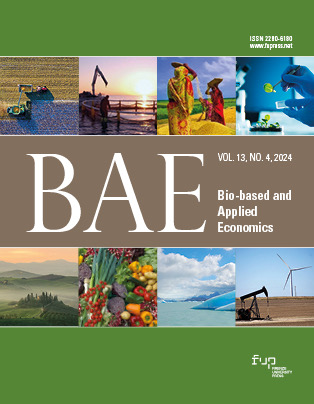Predicting the effect of the Common Agricultural Policy post-2020 using an agent-based model based on PMP methodology
Published 2024-03-27
Keywords
- CAP Reform,,
- Agent Base Model,
- Land use,
- Structural change,
- CO2 Emission
How to Cite
Copyright (c) 2023 filippo home arfini

This work is licensed under a Creative Commons Attribution 4.0 International License.
Abstract
The objective of this study is to perform an ex-ante assessment of the potential impacts of agro-environmental measures included in the post-2020 Common Agricultural Policy (CAP), by estimating farmers’ responsiveness in adopting organic agricultural practices and an eco-scheme that incentivises extensive forage systems. This research is conducted by means of an Agent-Based Model (ABM), based on Positive Mathematical Programming (PMP), implemented in GAMS. The ABM facilitates the simulation of interaction among farmers, allowing for an analysis of farm heterogeneity. The PMP methodology adds a non-rational dimention to the farmers’ economic drivers. The model is calibrated using 2019 Farm Accountancy Data Network (FADN) data specific to the Emilia Romagna region in Italy. Our findings reveal significant impacts on land use, with a notable decrease in cereal cultivation in favour of protein and fodder crops. Moreover, structural shifts are observed, notably a decrease in the number of small-scale farms. We also assess environmental and economic implications, observing a modest reduction in CO2 equivalent emissions per hectare, an increase in water demand, and an overall economic stability among farms, as indicated by changes in gross margin per hectare.






